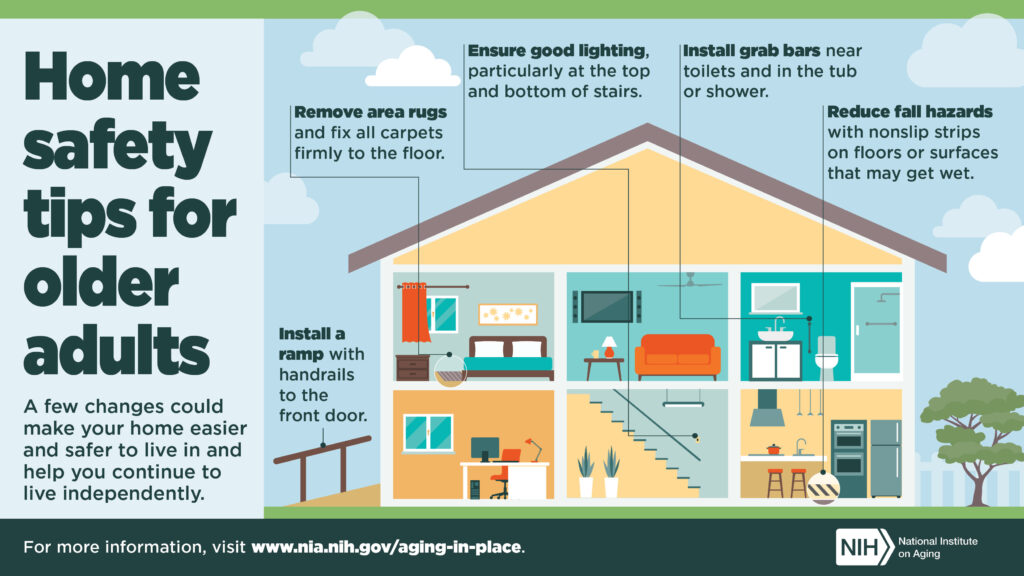From the National Institute on Aging

Being a caregiver or care partner is a big undertaking. Caregivers don’t just manage someone else’s health care, daily tasks, financial decisions, and other logistics. They also have their own schedules and responsibilities to balance. It can be hard to know where to begin!
Whether you’re new to caregiving or have been doing it for a while, the National Institute on Aging’s (NIA) website has expert-backed advice to help make things more manageable. Here is just a sample of what you’ll find.
New to caregiving? Start here
As someone’s caregiver, it’s important to learn as much as possible about their medical condition. This way you can better anticipate their needs and how to manage their health care over time, including in an emergency. Ask the person about what treatments they are getting or medications they take. Get their health care providers’ contact information.
If someone is hesitant to talk about their health with you, explain that knowing this information will help you care for them. They may prefer that you talk to their health care provider directly. Remember that, by law, you need written permission from them to receive their medical information unless they can give consent to the provider in person.
The Caregiver’s Handbook
The Caregiver’s Handbook is available to download online or order for free. It outlines basic information on topics such as:
- Finding care needed at home
- Long-term care facilities
- The costs of caregiving
- How to coordinate medical care
- Planning ahead
- Caring for yourself, too
Get caregiver training
Hospitals, state and local governments, and nonprofit organizations sometimes offer free or low-cost training for caregivers. Check whether Medicare or Medicaid will cover some of the cost, too!
Helping someone with exercise
Many caregivers help older adults and people with chronic health conditions with mobility challenges. Physical activity is important for just about everyone, including caregivers. Talk with the person’s health care provider about what’s best and see whether there are any exercises you two can do together.
Check out NIA’s exercise ideas for someone with a chronic condition such as:
- Alzheimer’s disease and other dementias
- Arthritis
- Chronic obstructive pulmonary disease (COPD)
- Type 2 diabetes
- Heart health issues
- Osteoporosis
- Chronic pain
Tracking and sharing caregiver duties
Caregiving involves keeping track of a lot of responsibilities and needs. NIA has worksheets to help you remember everything and delegate responsibilities to other family or friends when you need extra hands. These worksheets include checklists about:
- Caregiver responsibilies
- Medications and supplements
- Important documents and paperwork
If you need to share caregiving responsibilities with others, think about everyone’s personal limits and who will be the best person for each task.
Making someone’s home safer
If someone is still living in their home while in your care, look for potential falling hazards or areas where they may need extra help to move around the house. NIA has a home safety checklist with suggested precautions. You can also follow this room-by-room guide.
Other resources include:
- Advice for helping older adults avoid falls and fractures
- Information on aging in place and knowing when it’s time to move somewhere more suitable
Your state or local government may have home modification programs to help older people prevent falls. Ask your local health department or Area Agency on Aging, or search the Eldercare Locator.
Finding services and community resources
Some nonprofit organizations and government agencies offer services for older adults to help reduce some of the caregiving workload. If an older adult needs help with daily needs, from chores to grocery shopping to getting dressed, there may be a local service to help with that.
These services may be free or low-cost. In some cases, they may be covered by health insurance, Medicare, or Medicaid. Eldercare Locator is a good place to start your search.
NIA also has ideas for finding services, including:
- Home health services
- Transportation, including for patients with dementias
- Money management for older adults
- Nutrition and meal services and their eligibility
- Personal emergency medical alert systems for patients who may live alone
- Adult day care
Caregiving for someone with Alzheimer’s disease
Alzheimer’s disease and related dementias can present unique challenges for caregivers. Daily life, social gatherings, and other medical conditions need special attention. NIA has a variety of resources for caregivers of people with Alzheimer’s and ideas for getting help with caregiving. Explore more information on topics such as:
- Adapting activities for people with Alzheimer’s
- Tips for helping someone with bathing, grooming, dressing, and eating
- Taking someone with Alzheimer’s to the hospital
- Legal and financial planning
Still have questions about caregiving?
The NIA information centers are here to help. Staff answer telephone, email, and written requests and make referrals to local and national resources. Support is available Monday through Friday, 8:30 a.m. to 5 p.m. ET.
National Institute on Aging Information Center
Call 800-222-2225 (toll-free) or email niaic@nia.nih.gov for more information about health and aging.
National Institute on Aging Alzheimer’s and Related Dementias Education and Referral Center
Call 800-438-4380 (toll-free) or email adear@nia.nih.gov for more information about Alzheimer’s and related dementias.


